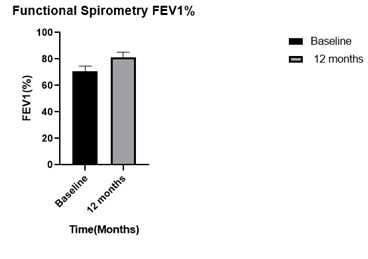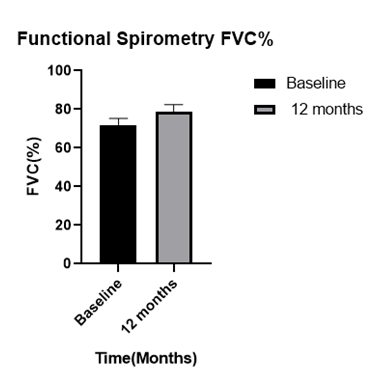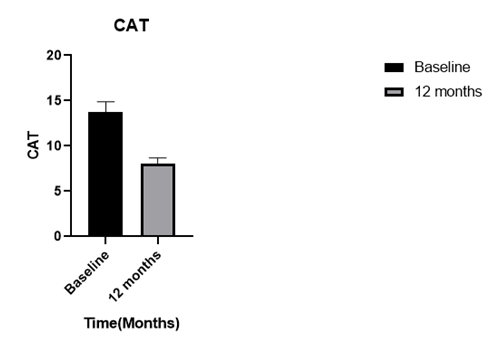31 Gennaio 2023 ![]()
The associations of various antioxidants (Zinco Vitamin A and D) in a cohort of population with chronic obstructive pulmonary diseases: A single ambulatory prospective observational study.
1 Marco Umberto Scaramozzino, 2 Sapone Giovanni 3 Sheenam Sheenam, 4.Anna Cancelliere,5. Guido Levi
1.MD Pulmonologist Director Ambulatory of Pulmonology “La madonnina” Reggio Calabria (RC), Italy, Head of Thoracic Endoscopy Service Tirrenia Hospital, Belvedere Marittimo (CS)
2.Head of Nursing Department of Cardiology Polyclinic M.d.c. Reggio Calabria (RC), Italy
3. Sheenam S. United Lincolnshire Hospitals NHS Trust, Lincolnshire Department General Medicine.
4.Pneumologist – Casa della Salute Chiaravalle Centrale Hospital – ASP Catanzaro.
5. Pulmonology department, ASST Spedali Civili Brescia, Italy, Department of clinical and experimental sciences, University of Brescia, Brescia, Italy
INTRODUCTION
Vitamin D is customarily involved in maintaining bone and calcium homeostasis. However multiple studies have indicated corelations between low serum levels of vitamin D, perturbed pulmonary functions and enhanced incidences of inflammatory diseases for the strong inter-relations with vitamin D deficiency and progression of lung disorders; however, the underlying mechanism is still unknown (1).
OBJECTIVES
The aim of the study is to test by means of vitamin D dosage in patients with mild-to-moderate COPD,whether the rate of exacerbations is reduced after about 12 months(from January 2022 to December 2022), assuming that vitamin D together with conventional therapy with ICS/LABA plays an important role in preventing the annual exacerbation rate. exclusion criteria are: pregnant women and subjects with missing data for smoking, BMI, physical activity, and spirometry.
METHODS
The cohort of 20 patients was screened for asthma and COPD between January 2022 and December 2022 at my outpatient clinic, by performing spirometry with bronchoreversibility. Patients at the first visit also had a mild vitamin D insufficiency documented by laboratory tests. They performed vitamin D dosage at baseline and at 12 months after having been treated with a dietary supplement based on Zinc, Vitamin A, Vitamin D, Vitamin C (ZincoVITAD) taken twice a day for 40 days and for a number of 4 cycles per year.
Two lung function markers were selected for the current analysis. These were forced vital capacity (FVC) and forced expiratory volume in 1 s (FEV1). We used as reference values to define vitamin D insufficiency this laboratory range: 10 – 30 ng/mL. To assess one-year relapse rate we used CAT. We performed statistical data analysis with Graphpad Prism 8 platform, with analysis of DS and row means.
RESULTS
The results are encouraging in that they make it possible to state how, taking vitamin D, in four annual cycles twice a day for 40 days, together with daily inhalation therapy would act on the adaptive immune response(2), allowing the inhibition of the proliferation of immunoglobulins by B lymphocytes and the suppression of certain pro-inflammatory cytokines by CD4+ T lymphocytes, the inhibition of the development of Th subpopulations (Th1, Th17,Th9) leading to the upgrading of certain regulatory T cells. This has a direct effect on the annual exacerbation rate related in particular to asthma and COPD, as can be seen in tables (1,2,3 and 4).




CONCLUSIONS
We can say that:
- The role of vitamin D and maintenance inhalation therapy is mainly on long-term adaptive immunity in preventing exacerbations of chronic obstructive diseases (asthma and COPD)
- Functional parameters are most improved in terms of FEV1 as a percentage of predicted at 12 months, with halving of the CAT (COPD assessment test) and improvement in the degree of dyspnoea perceived by patients.
- The cohort examined is small, further randomised controlled longitudinal cohort studies are still needed to further confirm the evidences.
BIBLIOGRAPHICAL REFERENCES:
- Shaniya Ahmad et al Journal of Nutr. Biochem. 90(2021) 108571
- The immunobiological and clinical role of Vitamin D in obstructive lung diseases Solidoro P.; Bellocchia M.; Facchini F.







